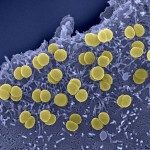Link to Pubmed [PMID] – 22046231
PLoS ONE 2011;6(10):e23995
Neisseria meningitidis is a human pathogen responsible for life-threatening inflammatory diseases. Meningococcal penicillin-binding proteins (PBPs) and particularly PBP2 are involved in bacterial resistance to β-lactams. Here we describe a novel function for PBP2 that activates human and mouse dendritic cells (DC) in a time and dose-dependent manner. PBP2 induces MHC II (LOGEC50 = 4.7 µg/ml ± 0.1), CD80 (LOGEC50 = 4.88 µg/ml ± 0.15) and CD86 (LOGEC50 = 5.36 µg/ml ± 0.1). This effect was abolished when DCs were co-treated with anti-PBP2 antibodies. PBP2-treated DCs displayed enhanced immunogenic properties in vitro and in vivo. Furthermore, proteins co-purified with PBP2 showed no effect on DC maturation. We show through different in vivo and in vitro approaches that this effect is not due to endotoxin contamination. At the mechanistic level, PBP2 induces nuclear localization of p65 NF-kB of 70.7 ± 5.1% cells versus 12 ± 2.6% in untreated DCs and needs TLR4 expression to mature DCs. Immunoprecipitation and blocking experiments showed thatPBP2 binds TLR4. In conclusion, we describe a novel function of meningococcal PBP2 as a pathogen associated molecular pattern (PAMP) at the host-pathogen interface that could be recognized by the immune system as a danger signal, promoting the development of immune responses.

